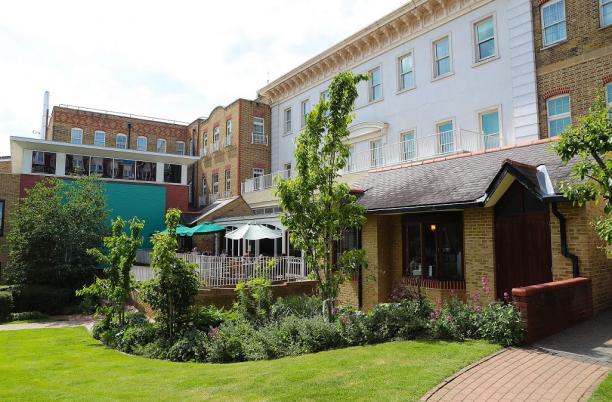

Since the Covid-19 pandemic took hold the picture from within care homes has been slow to emerge. We spoke to a London care home about how they’ve adapted to the needs of their residents, and feeling cut off from access to testing.
Nightingale Hammerson has been providing specialist residential care for the Jewish community for 175 years. The charity’s origins stem from three homes opened to house poor Jewish people in the East End of the capital in the 1840s. Over the years Nightingale has won awards for its care; most recently it was named Care Home of the Year by the National Gold Standards Framework, and was rated ‘outstanding’ by the Care Quality Commission (CQC) at its latest inspection.
It currently has two sites; Nightingale House, in south London, can accommodate over 200 people, split into nursing units with 24-hour support and residential units, while the building in north west London closed for redevelopment before the Coronavirus outbreak began.
Nuno Santos Lopes, Care Quality Improvement Lead at Nightingale, explains that they began preparing for the Coronavirus outbreak weeks before it was declared a pandemic. “We started having our own Cobra meetings to plan how we were going to deal with this infection control crisis that could come at any time, and how we would communicate with our residents, their relatives, our trustees and with the community overall.”
Talking to families
They very quickly implemented isolation measures for any residents that started to display symptoms such as a new continuous cough or a temperature above 37.8 degrees. They also decided to close the care home to visitors ahead of the government’s guidance to do so. “From the way things were moving we knew that at a certain point closure for visits would be advised, so we didn't wait” he says.
Relatives were given clear medical reasons for not being able to visit, with staff explaining that the more contact they had with people from outside, the greater the risk of bringing the virus into the care home. Nuno says people were very understanding, even those who would visit every single day, helped by the fact that they were offered alternative ways to keep in touch.
“We needed to find strategies to prevent residents from becoming isolated, and also make sure family wouldn’t be deprived of first-hand information. We set up Skype and Zoom calls on demand which have been very successful, because when you speak to someone on the phone you never get the full picture of what's going on, but when you see their face it's very reassuring.”
“We also have people with dementia who cannot really express themselves verbally, so we’ve been recording videos of moments where they’re enjoying whatever activity they’re doing and sharing it with their relatives, with the consent from their power of attorney and so on. These kinds of things are helping relatives cope with the fact that they cannot see them”.
The exception is when someone is at the end of life, when they’re able to visit and even stay with them for their last few hours.
Testing issues
The care home has around 350 members of staff, but despite this large number and the nature of their work, access to testing for Covid-19 is very limited. “Since last week it’s been possible for our staff to get tested, which is great, but the problem is accessing the testing centres” Nuno says. “Our staff need a car or someone in their family who’s able to drive them there. But we live in London, where a lot of people don’t have a car. They can’t use public transport or taxis, so they can’t get tested because they don't have any way of reaching the centres.”
While that’s far from ideal, residents cannot be tested at all, even if they have symptoms. The reason they’ve been given is that they’re “not the priority because we’ve already had suspected cases. They’re testing places where there haven’t been any cases”. Nuno says they’ve yet to find out why they’ve arrived at this decision, “because it goes completely against what Matt Hancock said last week. We feel like we're being cut off.”
“We’d like to test the residents that start presenting symptoms because it will help us understand if they’re related to Coronavirus or if it’s something completely different. That would help guide our clinical approach and find out whether that resident really needs to be in isolation, because at the moment, whether a temperature is due to a urine infection or a chest infection we’re treating it the same way - with isolation.”
“Testing is not being implemented equally around the country” he adds.
Sourcing PPE
Another challenge is getting adequate supplies of personal protective equipment (PPE), crucial to protecting the health of frontline staff. “The stock we’ve been provided by Public Health England would only last us for two days, so we’ve had to be very creative. We’re currently purchasing it directly from factories in China because here in the UK it's very hard to get anything. It still takes longer – in the past if we ordered it on Monday we’d have everything we asked for by Thursday. Now it takes three weeks, and we might only get half the stock.”
Despite these issues Nuno says Nightingale is well equipped to deal with the pandemic compared to other care homes, particularly in terms of end of life care. “It’s been an eye-opening experience for all care homes, where more than ever we’ve had to be prepared to plan in advance for residents’ care and have the right skills to manage symptoms. We felt we were well prepared for this as a big provider, but I think it may be very challenging for smaller care homes to deal with this increase in the number of people dying.”
More information
- For more information visit Nightingale Hammerson
